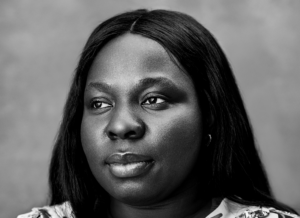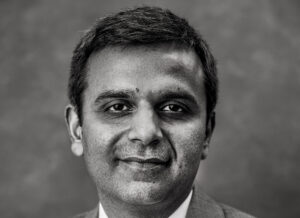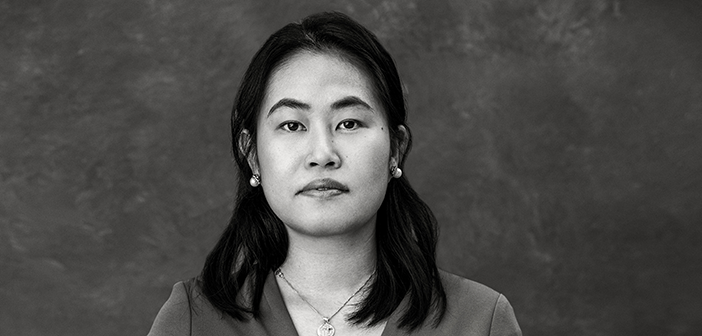For over seven years, the Medical School has been empowering leaders to champion social justice in health care.
Over the past two years, state legislatures across the country have introduced dozens of bills banning or restricting diversity, equity, and inclusion initiatives in public higher education. At press time, 11 states now have such laws, most recently Kansas, which prohibits DEI considerations in admissions and hiring decisions. Even as medical education organizations such as the Association of American Medical Colleges and numerous professional societies have strengthened their commitment to DEI and anti-racism in teaching, recruitment, and practice, these laws take aim at years-long efforts to combat health disparities. But equity is not a zero-sum game, says Patricia Poitevien ’94 MD’98, MSc, the senior associate dean of diversity, equity, and inclusion at The Warren Alpert Medical School.
“Many people think of DEI as benefiting one group of individuals … but DEI actually, when it’s done well, it’s for everyone,” Poitevien says. “If we create a system that helps these groups that have suffered disparities, then what’s amazing is actually we help everybody. Everybody gets better care. Everybody has similar health outcomes. Everybody benefits. And I think we need to make that argument more loudly.”
In 2017, the Medical School launched a program to train faculty, residents, and students to advance social justice, health equity, and anti-racism in health care. Brown Advocates for Social Change and Equity, or BASCE, selected eight fellows that first year, who attended monthly training sessions spanning topics from structural racism to workshop design, and pursued a project that addressed health disparities and equity issues. They graduated from the program as leaders trained to effect lasting change, at Brown and beyond.
“The program … did an amazing job filling a gap and addressing a need that was clear,” Poitevien says. “And the need was to have some basic understanding of how racism and systems of oppression impact our patients.”
Associate Dean for Gender Equity Katherine Sharkey, MD, PhD, a graduate of that first BASCE class, says Brown’s ongoing commitment to the program “legitimizes DEI and anti-racism work” in the face of those seeking to ban it. “Just by [BASCE’s] existence, it says, this is important. This means something. This is what we believe,” says Sharkey, an associate professor of medicine and of psychiatry and human behavior. “We aren’t just saying we believe it, we are devoting resources—not the least of which is people’s time and effort—to becoming better practitioners of what it means to be anti-racist, what it means to create a work and learning environment that fosters belonging for everyone … and also allows us to deliver non-inferior care to [all]people.”
Challenges and Opportunities
At seven years old, BASCE has grown and evolved, and now boasts a competitive application process and, beginning last year, a dedicated faculty member to lead it. Anne Vera Cruz, PhD, joined the Medical School’s Office of Medical Education as the assistant dean of curriculum for diversity, inclusive teaching, and learning in 2021. As Vera Cruz reviewed the curriculum for bias and coached faculty in inclusive teaching practices, Poitevien saw an opportunity to fulfill a longtime ambition to grow BASCE into a more rigorous, research-based fellowship.
“Why wouldn’t we have the smartest person in the room teach these topics and really help us to expand what the scope of BASCE is?” says Poitevien, who oversees the Medical School’s Office of Belonging, Equity, Diversity, and Inclusion (OBEDI).
BASCE was the brainchild of Bryan Leyva MD’18, who had sat on task forces that drafted the Medical School’s Diversity and Inclusion Action Plan and that reviewed the teaching of race in the curriculum. In 2017, he emailed Joseph Diaz MD’96 RES’99 F’01 MPH’09, the associate dean for diversity and multicultural affairs, with a proposal for BASCE and the prediction: “This has the potential to be one of [OBEDI’s] staple programs.”
Leyva’s vision is “pretty much what BASCE became,” Diaz says. The inaugural OBEDI student fellow, Ry Garcia-Sampson ’12 MD’19 MPH’19, brought the program to fruition—recruiting a diverse pool of applicants, designing the curriculum, bringing in guest lecturers, and leading discussions on race and racism. “Ry ran with it,” Diaz says. “I can only take the credit of being a facilitator [and]cheerleader.”
In subsequent years, OBEDI student fellows continued to run BASCE. Most valued the leadership opportunity, and most BASCE alumni, like Sharkey, praised the program and its impact on their teaching, advocacy, and practice. But, Diaz notes, “Bryan’s original idea was that this be led by faculty.”
While applauding former student fellows’ work leading BASCE, Poitevien says that, over the years, the “challenges” of that structure became apparent. “Unlike most of medical education where the students know the least and faculty know the most, this was definitely an area where everyone had a totally different level of understanding and knowledge—and sometimes, students actually knew more than the faculty members did,” Poitevien says.
However, medicine’s inherent hierarchies sometimes hindered open and honest discussion and debate between students and faculty. The depth and breadth of knowledge required to teach topics as dynamic as social justice, race relations, and health equity further complicated the task for BASCE’s student leaders—who had only completed three years of medical school when they took the job. “The scope of information that needed to be shared with the learners just grew exponentially,” Poitevien says. “Even the most dedicated student would not be able to have the expertise needed to create a comprehensive program to teach all the learners the content that they would need to know.”
Enter Vera Cruz, who, before coming to Brown, had more than a decade of experience in STEM-based curriculum development and evaluation, instructional coaching, and research. She believed her research background in particular could help push BASCE forward, as Poitevien envisioned. “What we’re trying to do here … is to improve health care for everyone,” Vera Cruz says. She asked herself: “How can I make changemakers?”
Vera Cruz began by thinking about what “BASCE” stands for. “You’re ‘advocating for social change and equity,’” she says. “To do that, we need to think about what that means in the context that we are in, and invest in the current talent that we have in Brown, which is a lot, and really help these folks translate it into practice. I believe this is what is needed for the projects to have sustained impacts locally, nationally, and globally.”
That requires a lot of hands-on time, Vera Cruz is the first to admit. “I really do feel pulled in different directions,” she says. Not only is she leading monthly sessions for the entire cohort of 10 fellows, they also meet individually with her each month to discuss their projects. The OBEDI student fellow, Idowu Olugbade MD’25, still has a role in BASCE, including providing additional support for the four medical students in the program.

Idowu Olugbade MD’25
One thing not required of BASCE fellows is research experience. Vera Cruz helps them with everything from project design to grant writing to publication or implementation. She connects fellows with the institutional review board or the Office of Continuing Medical Education, or she calls them herself. She helps them design effective surveys and suggests who to send them to. “I don’t think any one of these fellows has experienced having a dedicated person supporting them in every step of their research journey,” Vera Cruz says.
Growth Mindset
“I never previously thought of myself as a researcher,” says BASCE fellow Zain Khalid F’20, MD, an assistant professor of psychiatry and human behavior. “The meetings I’ve had [with Vera Cruz]have been transformative for my project, but also for my own confidence in whether I can do this.”
Khalid treats people with acute mental illness at Butler Hospital’s intensive treatment unit and frequently sees his patients, upon discharge, unable to connect with outpatient mental health services. He says he applied to BASCE because “there was something wrong upstream. There’s something wrong that I could do more about.” Vera Cruz helped him design an analysis of Rhode Island’s community mental health resources, using both data and provider surveys, to identify gaps in care, as well as solutions from other states. He hopes to use his findings to advocate for improvements. As a clinician with little research experience, the project “represents for me a sort of growth,” Khalid says. “And I’ve BASCE to thank for it, and Anne specifically.”
Franklin Iheanacho MD’25 has been studying disparities since before medical school, from social determinants of health and workforce issues to—this year as a research fellow at Dana Farber Cancer Institute—gaps in the uptake of novel cancer therapeutics. An aspiring radiologist, he came to BASCE this year wanting to evaluate disparities in interventional radiology procedures. Vera Cruz urged him to get more specific.
“She pushed me a little bit,” Iheanacho recalls. “How can we change the research question so that it’s a bit more interesting and it helps us identify the other important structural factors?” His analysis, which he hopes to present and publish, examines the use of uterine artery embolism nationwide, and how it may be mitigated by factors such as whether a hospital is urban or rural, as well as the diversity of the patient population.
When Joshua Goldenberg MD’24 applied to BASCE, he proposed a literature review to examine barriers to the use of electroconvulsive therapy, a highly effective psychiatric treatment whose reputation has suffered due to past inappropriate use and resultant portrayals like One Flew Over the Cuckoo’s Nest. Vera Cruz suggested he survey Rhode Island providers to understand the problems they have referring patients to ECT, and Olugbade helped him refine his questions.
“I’m still at a very nascent stage in my career and don’t have much background and experience, so their being able to help frame the problem more succinctly has been helpful,” Goldenberg says.
“We really want people to think a little bit outside the box, to not do traditional social justice research, which has been done over and over again,” Olugbade says. “With changemaking comes … thinking about, how can you take the research that is already out there, and add to it in a meaningful way?” While residents and faculty come to BASCE with more specific goals because they’ve seen a need firsthand and know what literature is out there, Olugbade adds, students don’t yet have that experience. She says she and Vera Cruz help the students design and implement “the project that they actually want.”
Poitevien says Vera Cruz’s expertise is making possible BASCE’s goal at its founding. “That big thinking that we are always encouraging individuals to do is actually met with a skill set that can help to advance those big ideas and those big visions,” she says.
Some fellows came to the program with work already underway, hoping to take it further. Associate Professor of Pediatrics Tanya Rogo F’13, MD, MPH, is the vice chair of the DEI task force for the Pediatric Infectious Diseases Society (she’ll become chair next year). She’s also the founding course director for grand rounds, held quarterly online, that address equity issues identified by society members, from microaggressions to underrepresentation to the particular challenges faced by international medical graduates. Rogo says she applied to BASCE because “I wanted to see how to continue to grow this [webinar series]and also assess its impact.”
For her BASCE project, Rogo proposed to society leaders offering CME for the series, a decision that’s pending. Whatever the outcome, Rogo says her project has significant implications for her specialty, because it’s “approaching a crisis. In the future, there’s not going to be enough pediatric ID doctors to go around.” Cultivating diversity and inclusion will not only help more providers feel welcome, but better reflect their patient populations. “Patients do better when their doctor has similar lived experiences to them,” Rogo says.
There’s one goal she knows the grand rounds have already met: raising members’ awareness. In surveys after each webinar, participants often say, “I just didn’t know. I was not aware that this was an issue,” Rogo says. “At the very least, to me, that’s what I want to be able to achieve.”
Jinen Thakkar, MD, also came to BASCE to share his knowledge. During the COVID-19 surge in India in spring 2021, Thakkar—who was born and raised in the country—and another Kent Hospital physician coordinated a massive airlift of medical supplies to Delhi. Everything was donated, from the $4 million worth of goods to the four United cargo flights. He pulled off a similar feat after the earthquake in Syria last year.

Jinen Thakkar, MD
For BASCE, Thakkar, an assistant professor of medicine, is completing a process evaluation of those two projects: “the entire work that I’ve done pertaining to sending out international aid, defining it and putting it down … [and]getting it out there so that in case somebody else wants to replicate it, they’re able to do it,” he says.
He’s boiled the process down to three (very complex) steps: collecting the supplies, transporting them, and working with partners at the destination to receive them. Thakkar and his colleague learned how to store the goods, operate a powerjack, load a truck, generate an airbill, and so much more. “It was a crash course in all things logistics,” he says. They worked with the team in India on custom clearances, and with a Syrian NGO to navigate shipments to a war zone.
Thakkar received media attention and accolades for his work, including a letter of thanks from the Government of India and the Rhode Island Medical Society’s Halifax Award, which recognizes “outstanding medical volunteerism.” But his BASCE colleagues are equally impressive, he says: “The kind of projects that everyone is doing is truly amazing.”
On the Same Team
Each class of BASCE fellows represents the diversity of Brown’s medical community; no student is from the same class year, and no trainee or attending is from the same specialty or hospital or career stage. They have different backgrounds as well, bringing an array of experiences and perspectives. Vera Cruz then cultivates the group to build rapport and trust—an inclusive environment where they feel free to speak their minds. When she held a debate five months into the program, many fellows vigorously disagreed with each other—and told Vera Cruz afterward that it was their favorite session.
“You say that now,” she says she told them, “but I couldn’t do that in the first or second session.” It took a lot of work to create a cohort with that level of comfort with each other. “I really think about, how can I get them there? I think that is the hardest part,” Vera Cruz says. “If I’m doing my job right, it feels effortless, or it feels like magic.”
Laying the groundwork for difficult yet productive conversations is a key leadership skill that BASCE was designed to impart. Vera Cruz reminds fellows that, as leaders, they must learn how to speak to, and more importantly listen to, people who disagree with them. “Now they know that it is possible. It’s easier for them to then do the same thing in the future,” she says.
Neishay Ayub MD’14 RES’15, an assistant professor of neurology who graduated from BASCE two years ago, organizes social events for her residents to discuss DEI topics. She believes these “diversity dialogues” work because they’re held in comfortable, non-work settings where residents can eat and get to know each other. “In my view, if you can’t have a meaningless conversation, you can’t expect to have a meaningful one,” Ayub says.
Fellows say they are learning not only how to build a community, but also the language and the frameworks to engage with it. Goldenberg says he can now better articulate how unfair policies can lead to disparities and explain this to others who may disagree, so that they “understand the implications … [and]buy into that idea when they may not share that vocabulary.” Thakkar, a core faculty member of the internal medicine residency program at Kent, adds, “I’ve become much more comfortable with broaching this topic” of race and addressing bias issues, “rather than being a bystander.”
The fellows credit each other as well as Vera Cruz for this education. Iheanacho says the group’s diversity “helps you see a different point of view. How do people see race? How do people see certain topics within critical race theory?” He adds, “I’m learning a lot from them.”
They’re also supporting each other on their projects. Rogo appreciates the feedback of other fellows when they break into small groups to discuss their work. Goldenberg has gotten input for his survey from Khalid, who has firsthand experience with the challenges of referring patients to ECT.
“One thing that I’ve felt really positively about through BASCE is the sense of community you feel with other colleagues, all with really inspiring ideas themselves,” Khalid says. “It provides me with a sense of connection with folks that are also trying to do something. They’re also kind of restless. They’re not happy with things as they are. They want to effect some sort of change. … [BASCE] gives us an avenue to channel that into a common purpose.”
Pay It Forward
Ayub applied to BASCE after becoming the neurology department’s DEI officer, with a slew of ideas for projects. “To be perfectly honest, I don’t remember what my [formal]project was because I ended up doing a lot of” them, she says. Since 2021, she has helped design a microaggressions workshop for residents, organized a two-day visit from a theater group to practice difficult conversations, and last year, piloted a summer program for University of Rhode Island undergraduates from underrepresented groups to shadow clinicians and conduct mentored research projects. All three stayed on through the fall to continue their research, and one was hired by his mentor as a research assistant after graduating. “That’s been really great,” Ayub says. “We’ll do it again this summer.”
Sharkey, who leads Brown’s Office of Women in Medicine and Science, says BASCE sharpened her understanding of intersectionality—how sexism is compounded by other biases—so that she could better represent women of all identities. She’s also more comfortable addressing issues of sexual and gender identity. Her title, associate dean for gender equity, acknowledges that “there is a ton more work we need to do not only for women, but for nonbinary- and trans-identifying folks in our learning and workspaces,” she says.
Current fellows are already envisioning how they’ll apply what they’ve learned in the future. Thakkar has his sights set on a more local problem: food insecurity among Rhode Island college students. “My idea for that is to set up a community store, which I can stock with the help of local vendors,” he says. “Students can just walk in and pick up whatever they want. … It’s a much more dignified way of giving them what they need than [handing them]a box of stuff.”
Meanwhile students and residents have the potential to bring their BASCE training to other institutions, “so it’s important for them to have the framework that this is how you do social justice work so that when [they]get to a position of power … they already have the tools to be able to influence some change,” Olugbade says.
Bryan Leyva is now a hospitalist and assistant professor at the University of Miami Miller School of Medicine. “I love a good challenge,” he says. He came to Florida—one of the states that restricts DEI training and staff—last year because “we need folks who are very critical and who are willing to speak out,” not only to dispel myths about DEI work, but to share evidence about its positive impact on patient outcomes. “This larger political landscape really makes programs like BASCE not only needed but even more important,” he says.
Leyva leads an anti-racism and equity curriculum for interns in the internal medicine and pediatrics residency program, and he’s working—with leadership support—to expand it across all four years of residency and to other programs. “I’m very lucky,” he says. Building a community, sharing his knowledge with others, and serving as their mentor and resource are core principles of BASCE, he adds: “Now other people can turn to you, and they know that they have someone that will listen and that you care about the things that they care about.”
When he wrote his proposal for BASCE, Leyva envisioned an alumni base actively cultivated to stay involved with the program. In reality, graduates have networked more informally. Ayub found like-minded colleagues who could support her in her new role as a DEI officer, but she wishes BASCE offered events for alumni, or opened up sessions to them. “It’s a fantastic program,” she says. “I wish I could do it again.”
Current fellows were already telling Vera Cruz and Poitevien months ago that they didn’t want the program to end, that they want to stay connected. “What I’m really looking for is, were you able to find a community here?” Vera Cruz says. “I think that says something about the value that they find”—not just in her as their teacher, but in each other.
While Vera Cruz has no formal plan (yet) to continue working with this year’s fellows after they graduate, she won’t lose them easily. Tanya Rogo, for one, knows where she’ll look for support as she develops her grand rounds curriculum. “My plan is to continue to reach out to Anne,” she laughs. “That’s my plan.”




